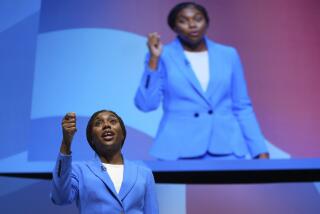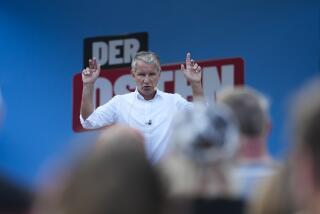Woman to Lead Conservatives in German Election
BERLIN â Germanyâs conservative opposition parties announced Monday that Angela Merkel, chairwoman of the Christian Democratic Union, would be their candidate for chancellor in early national elections expected to be held this autumn.
Merkel, who was raised in the former communist East Germany, had been widely expected to seek the chancellorship and would become the nationâs first female leader if she prevailed against current Chancellor Gerhard Schroeder.
At a news conference Monday, Merkel promised to present an electoral platform by mid-July that would emphasize the âcourage to be honest.â
âFinding ways to create jobs for the people in Germany will be at the center of my work,â she said.
Bavarian Gov. Edmund Stoiber of the Christian Social Union, the CDUâs affiliate in the region, expressed his backing during a news conference in Berlin. âAngela Merkel has the full confidence and the full support of both CDU and CSU,â Stoiber said.
Schroeder set the stage for early elections last week, after his Social Democratic Party, or SPD, was defeated in an election for control of the largely working-class state of North Rhine-Westphalia, the nationâs largest. The defeat further weakened the nationwide coalition of the SPD and the Green Party.
âItâs time to get things straight in Germany,â SPD Chairman Franz Muentefering said in announcing the decision to move up national elections, originally scheduled for fall 2006. The vote is expected to be held Sept. 18.
Schroederâs party has lost power in almost every state legislature, and Christian Democrats now dominate the upper house of the national parliament. Last week, opinion pollster Infratest found that the SPDâs support among respondents stood at 29%, compared with 47% for the CDU and CSU.
In recent weeks, members of Schroederâs party in the lower house threatened to vote against his plan to boost the economy and create jobs by easing taxes on corporations. Germanyâs unemployment rate is 12%, and the European Commission estimates that the German economy will grow by only 0.8% this year.
At her news conference Monday, Merkel also addressed foreign policy concerns, stressing her view that Franceâs rejection of the proposed European Union constitution in a referendum Sunday showed that people were anxious about further enlargement of the 25-nation alliance.
âWe need a very honest discussion about a Turkish membership,â Merkel said, referring to talks between the European Union and Turkey scheduled to begin in October. Her party supports a so-called privileged partnership with Turkey rather than a full-scale membership in the alliance for the predominantly Muslim nation that straddles Europe and Asia.
Merkel has been on the political stage for 15 years. Her career began on the eve of German reunification in 1990, when friends talked the East German physicist into joining the Christian Democrats. Helmut Kohl, then chancellor and head of the CDU, called Merkel âmy girlâ and made her minister for womenâs affairs and later environmental minister.
Kohlâs bid for reelection was defeated in 1998, and the following year a scandal over a slush fund drove him from his post as party leader. Merkel took over the CDU leadership in 2000, after party strategist Wolfgang Schaeubleâs brief stint as chief.
Merkel is married and has no children.
More to Read
Sign up for Essential California
The most important California stories and recommendations in your inbox every morning.
You may occasionally receive promotional content from the Los Angeles Times.










